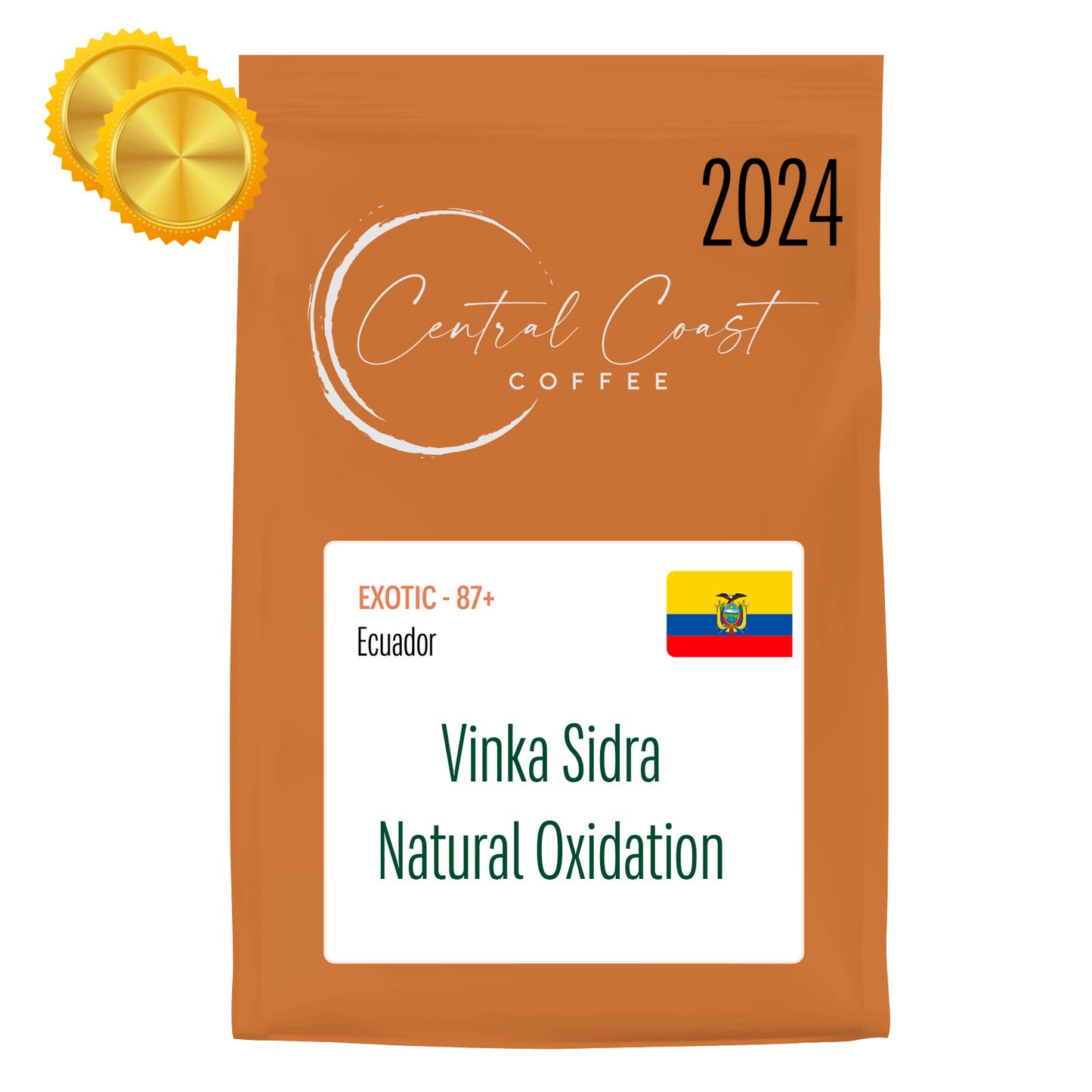
This coffee’s roasted in our filter style — meaning it’s designed to shine as black coffee rather than with milk. That doesn’t mean you have to brew it as a pour-over though. You can make it however you like — espresso, moka pot, AeroPress or anything in between. We simply roast it a little lighter to highlight the bean’s origin flavours giving you a cup that’s clean, vibrant and full of clarity.
Lighter roasting keeps more of the natural acidity and sweetness intact which makes for a beautifully expressive black coffee. This coffee is best enjoyed without milk as it’s too acidic and the flavours don’t pair well once milk is added.
If you prefer your milk coffee with richer caramel, toffee or nutty flavours you might enjoy our espresso range more. Those roasts are taken a little darker to bring out deeper sweetness and balance beautifully with milk.
Origin and Sourcing
?
?
Roast Details
?
?
Taste Profile
?
?
Ecuador | Vinka Farm | Carlos & Maria Fernanda | 2024 Sidra Natural Oxidation - When is peak freshness?
Medium Roast - Roasted on Roest L100 Ultra
Taste one coffee, in multile processing methods.
View the whole Vinka Farm Collection & story here.
This is our first directly sourced coffee — grown, processed, and shipped by Maria and Carlos from Vinka Farm in Loja, Ecuador.
We’ve secured four distinct lots of their Sidra varietal, each processed differently: Natural Anaerobic, Natural Oxidation, Honey, and Lactic Honey. Same cherries, different methods — and six unique cup profiles that show just how much processing changes flavour.
Other Information
Growing Temperatures: 12-24°C
About Vinka Coffee
Vinka Coffee is grown by Maria Fernanda and Carlos, two university researchers turned passionate specialty coffee farmers. Their farm, nestled in the highlands of Loja, Ecuador, embodies a commitment to biodiversity, sustainability, and precision processing.
Each micro-lot is carefully hand-harvested at peak ripeness, with cherries measured at 25° Brix. These cherries undergo innovative processes—ranging from anaerobic natural fermentation to lactic fermentation—to unlock diverse flavor profiles.
About Sidra Varietal from Vinka
The Sidra varietal is a unique Ethiopian landrace, not a hybrid, making it a pure genetic descendant from Ethiopia's rich coffee heritage. Brought to Ecuador through a research initiative, it combines exceptional cup quality with the potential for high productivity.
Sidra has gained international recognition for its complex sensory profile, often described as floral and fruity, with hints of blueberry, lime, honey, and blackberries. It also features a distinct menthol note, rarely found in other coffees, which sets it apart and attracts specialty coffee buyers worldwide.
Producers and experts in Ecuador emphasize its outstanding agronomic traits: a medium-sized, robust plant with high germination rates, generous yields, and a stable, uniform behavior in the field. Its versatility shines across various post-harvest processes, unlocking diverse flavor expressions.
With its growing acclaim, Sidra is poised to become a flagship coffee variety, rivaling the reputation of Geisha, and positioning Ecuador as a producer of some of the world’s most exquisite coffees.
Coffee in Ecuador
Ecuador is quickly gaining recognition in the coffee world for its high-quality specialty coffee production. With a combination of diverse microclimates, fertile volcanic soil, and dedicated producers like Maria Fernanda and Carlos, Ecuador is redefining what coffee lovers can expect from South America.
Natural Oxidation
Flavor Profile: Raspberry, blackberry syrup, cherry, lavender, caramel, with a refreshing mint finish.
Mouthfeel: Balanced with tartaric acidity, juicy body, and a harmonious sweetness-acidity profile.
Description: For those seeking balance, this process emphasizes a rounded, refreshing sweetness paired with juicy complexity.
How is it processed? The cherries are spread in a thin layer on raised beds to dry in the sun for 2–3 days. During this period, they are frequently moved to prevent fungal contamination. In this method, fermentation is endogenous, occurring inside the cherry under the peel while external oxygen helps to break down sugars. After this initial stage, the cherries are dried on shaded, stacked beds until they reach a humidity level of 13%. Once dried, the cherries are stored until export.
How do Anaerobic and Oxidation compare?
Oxidation is more balanced between acidity and sweetness, while anaerobic highlights acidity, a brilliant acidity!
The key difference between the Natural Anaerobic and Natural Oxidation processes lies in the fermentation environment. Anaerobic fermentation occurs in a CO2-rich environment outside the cherry, while oxidation fermentation takes place inside the cherry while they are exposed to oxygen.
SKU: vinka_natox_160g
Package Weight: 220g
How does my coffee come packaged?
- Choosing a selection results in a full page refresh.
- Opens in a new window.

